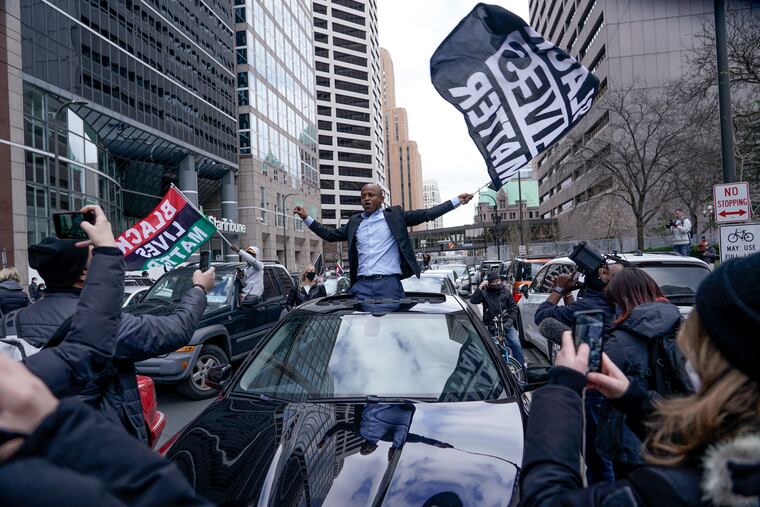Families of murdered Philadelphians know the hollow victory of justice | Helen Ubiñas
No verdict will undo the harm — whether it’s a death by state-sanctioned police brutality or by Philadelphia’s relentless gun violence.

Aleida Garcia watched the verdict against former Minneapolis Police Officer Derek Chauvin at home, alone, and found herself reliving the 2018 day she sat in a cramped Philadelphia courtroom praying for justice in the murder of her son.
It all felt so familiar, she told me moments after the Chauvin verdict was announced Tuesday: the anxiety, the adrenaline, and then, finally, the relief when, just like the man who murdered her son in 2015, Chauvin was found guilty of murdering George Floyd.
Victory — if only a painfully hollow one.
“It’s like the twilight zone,” Garcia said, recalling the day the man who killed her son was sentenced to life in prison. “You feel like somehow you earned a prize and the prize is having your child back, that he’s going to walk through the door, but of course that’s never going to happen.”
Because as she and other loved ones of murder victims know all too well: No verdict will undo the harm — whether it’s a death by state-sanctioned police brutality or by Philadelphia’s relentless gun violence that claimed nearly 500 lives last year and more than 150 so far this year.
I don’t begrudge anyone who took a moment to breathe Tuesday, who saw the verdict as a step toward justice — even if true justice would be a complete overhaul of policing and of the institutions, from the judicial system to the complicit newsrooms that have excused or explained away police misconduct.
I too was glued to my computer screen waiting for the verdict to be read, only able to mutter: “My God. My God. My God,” each time Chauvin was found guilty.
So many of us didn’t allow ourselves to believe this was possible. We couldn’t — not in a country where Black and brown people are routinely criminalized and demonized and dehumanized.
Where even if we find ourselves in the rare position to take that elusive one step forward, we’re almost immediately thrown off balance.
In a cruel gut punch, Tuesday’s relief was punctured by news that shortly before Chauvin’s verdict was announced, 16-year-old Ma’Khia Bryant was killed by a Columbus, Ohio, police officer who fired four shots at the teenager.
At news conferences Tuesday and Wednesday, police released body camera footage and said the teenager was lunging at two women with a knife as the officer arrived at the driveway of a residence.
That’s what they said, as the investigation continues.
But remember, police also initially said Floyd’s death was a result of a “medical incident,” failing to mention that one of their own had murdered a man by kneeling on his neck for more than nine minutes.
After the Chauvin verdict, there were tearful celebrations across the United States, where communities that had braced for the worst were still righteously skeptical but somewhat hopeful that the verdict might be the beginning of long-overdue reform. And in fact the Justice Department is launching an extensive probe into Minneapolis police.
There were no citywide celebrations after the verdict against the man who killed Garcia’s 34-year-old son, Alejandro Rojas-Garcia, outside of a North Philadelphia nightclub in 2015, only the resolve of a mother vowing to use her fleeting victory and her enduring pain to help other families of murder victims, a group that grows by the minute in Philadelphia.
I was in the courtroom in 2018 when Garcia exhaled after the jury’s verdict, and then turned to the women seated behind her, mothers whose children’s murders had not been solved, and vowed to help them.
“We’ll fight,” said Garcia, who formed the National Homicide Justice Alliance after her son’s death. And keep fighting, she said, until they got justice.
She was back at it again Wednesday afternoon, participating in a virtual meeting called by a group of mothers, grandmothers, and sisters of murder victims who wanted to talk about the verdict but who also know better than most what this last year has felt like for the Floyd family, and what it will feel like long after the cameras turn away.
As she relayed her feelings to the group about finding solace in accountability, I recalled something Garcia had told me earlier.
Justice can often feel “like water slipping through your fingers,” she said. But whether murder occurs at the hands of authorities or the hands of each other, there can never be any real peace without real, lasting justice for all.